Tensions Rise as Sanders Denounces Oligarchy in Nationwide Tour
In a climate of political unrest, Senator Bernie Sanders is championing a movement against what he perceives as the growing influence of billionaires in American politics. His “Fighting Oligarchy” tour aims to galvanize voters disillusioned with both President Trump’s administration and the Democratic Party’s response.
Sanders’ longstanding criticism of wealth concentration has found renewed relevance as Trump, alongside influential figures like Elon Musk, seeks to overhaul federal structures. Sanders remarked to NPR, “Well, when I talked about oligarchy over the years, I think for some people it was an abstraction.” He added, “Now though, people understand you have to be blind not to see that what we have today is a government of the billionaires, by the billionaires and for the billionaires.”
During a rally at Arizona State University, Sanders, accompanied by Rep. Alexandria Ocasio-Cortez, addressed a massive crowd, asserting, “We’re not going to allow you and your friend Mr. Musk and the other billionaires to wreak havoc on the working families of this country.”
The tour has drawn impressive numbers, with Sanders’ communications director reporting over 30,000 attendees at a Denver event, marking a record for the senator’s rallies.
The Trump administration’s aggressive push for federal cuts, spearheaded by Musk, has drawn criticism for creating confusion and chaos. Reports of budget cuts, contract terminations, and worker layoffs are fueling discontent.
The Democratic Party Faces Challenges
Despite the lack of control over Congress or the White House, the Democrats face their own challenges. A recent poll indicates declining approval for the party, amid calls for stronger opposition to Trump’s policies.
Ocasio-Cortez addressed this sentiment, emphasizing the need for unity against divisive forces. “Ironically, the most divisive forces in this country are actually starting to bring more of us together,” she stated, underscoring the importance of solidarity among working people.
Volunteers at Sanders’ events echoed this frustration, urging the Democratic Party to adopt a more assertive stance. One volunteer, Clarissa Vela, stressed, “They need to organize themselves, because that’s all that the only way this is going to work.”
In response to recent losses, Democrats have elected new leadership. However, the absence of a unified strategy remains a concern, with some members dissatisfied with Senate Minority Leader Chuck Schumer’s approach.
Looking Forward: Potential Shifts in Strategy
As Sanders continues to draw significant crowds, questions arise about why more Democrats do not adopt his rhetoric. While Sanders is not a Democrat, his progressive stance resonates with many voters frustrated by the current political climate.
Vermont’s Senator has long advocated for working-class interests, a message that seems to resonate across the political spectrum. “If you’re a working class Republican, you don’t think it makes a lot of sense to give a trillion dollars in tax breaks to the richest people in this country,” Sanders noted.
As the political landscape evolves, figures like Minnesota Gov. Tim Walz are beginning to echo Sanders’ criticism of Musk’s influence. At a recent event, Walz called attention to the ongoing issues with the healthcare system and emphasized the need for party reform.
This article was originally written by www.npr.org






